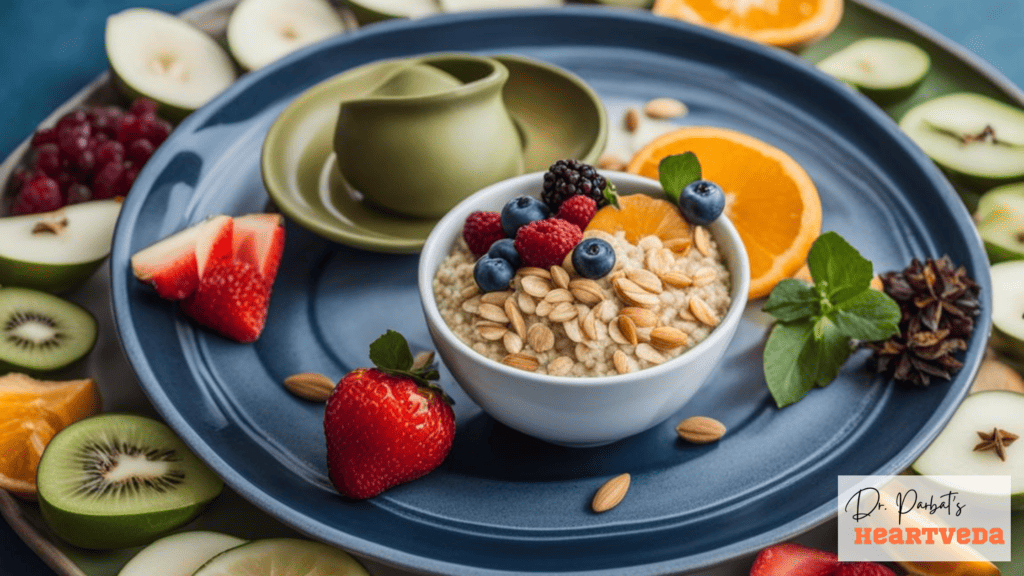
High cholesterol is a common health concern that can increase the risk of heart disease and stroke. If you’re looking for natural remedies to manage your cholesterol levels, Ayurvedic medicine offers promising solutions. Ayurveda, an ancient medicinal system practiced in India, focuses on holistic approaches to improve health and well-being.
Ayurvedic medicine for cholesterol control involves a combination of dietary modifications, herbal remedies, and lifestyle changes. Scientific research has shown that certain Ayurvedic practices can effectively lower cholesterol levels and promote heart health.
Ayurvedic herbs such as garlic, guggul, and arjuna are commonly used to treat high cholesterol. These herbs can be taken alone or in combination with other ingredients to create Ayurvedic medications. Ayurvedic remedies come in various forms, including juices, powders, tablets, extracts, and decoctions.
However, it’s important to consult with a healthcare provider before starting any Ayurvedic treatment, as herbal supplements can have side effects and may interact with other medications. Your healthcare provider can guide you on the best approach for managing your cholesterol levels through Ayurveda.
By combining Ayurvedic solutions with evidence-based methods such as increasing fiber intake, losing excess body fat, and adopting a healthy diet and lifestyle, you can take a comprehensive approach to cholesterol management. Working closely with a healthcare provider will ensure that you’re safely and effectively controlling your cholesterol levels.
Ayurvedic Remedies for High Cholesterol
Ayurvedic medicine offers various remedies to help control high cholesterol levels. These remedies encompass dietary modifications, lifestyle changes, and the use of herbal supplements. Scientific studies have shown that these Ayurvedic practices can effectively reduce cholesterol levels and promote overall health.
One of the key components of Ayurvedic treatment for high cholesterol is dietary restrictions. By making specific dietary modifications, individuals can lower their cholesterol levels and improve their cardiovascular health. Ayurveda emphasizes the consumption of whole, unprocessed foods and encourages a plant-based diet. Including a variety of fruits, vegetables, whole grains, and legumes into your diet can contribute to reducing cholesterol levels and maintaining a healthy weight.
In addition to dietary modifications, Ayurveda also recommends stress reduction techniques to manage cholesterol levels. High stress levels have been linked to increased cholesterol levels, which can have adverse effects on heart health. By incorporating practices such as massage, yoga, and breathing techniques into your routine, you can effectively reduce stress and promote overall well-being.
Another important aspect of Ayurvedic remedies for high cholesterol is the use of herbal supplements. Ayurvedic medicine harnesses the healing properties of various herbs to create powerful formulations for cholesterol control. Some commonly used herbs for cholesterol management include garlic, guggul, arjuna, turmeric, ginger, shilajit, and licorice. These herbs can be used individually or in combination to create Ayurvedic medications. Ayurvedic supplements come in different forms such as juices, powders, tablets, extracts, and decoctions.
It is crucial to consult with a healthcare provider before starting any Ayurvedic treatment or taking herbal supplements. This ensures that the chosen remedies are safe and compatible with any existing medications or health conditions you may have. A healthcare professional can guide you in selecting the most suitable Ayurvedic remedies and provide you with personalized advice for cholesterol control.
Incorporating Ayurvedic remedies for high cholesterol into your lifestyle can offer natural and holistic solutions to manage cholesterol levels. However, it is important to remember that Ayurveda should not replace conventional medical care. It should be used as a complement to evidence-based treatments and under the guidance of a qualified healthcare professional.
Ayurvedic Dietary Modifications for Lowering Cholesterol
Ayurvedic medicine offers a holistic approach to lowering cholesterol levels through dietary modifications. By incorporating Ayurvedic dietary practices into your daily routine, you can effectively reduce cholesterol, enhance heart health, and promote overall well-being.
Reducing Fat and Calorie Intake
One of the key Ayurvedic dietary modifications for lowering cholesterol is reducing fat and calorie intake. Consuming excessive fat and calories can contribute to high cholesterol levels. By making conscious choices to limit your intake of fatty and calorie-dense foods, you can support healthy cholesterol levels and maintain a balanced diet.
Emphasizing Plant Foods
Ayurveda places a strong emphasis on plant-based foods, which are naturally low in fat and cholesterol. Including a variety of fruits, vegetables, whole grains, legumes, nuts, and seeds in your diet can provide essential nutrients, fiber, and antioxidants that support heart health and help lower cholesterol levels. These plant foods also promote overall well-being and contribute to a balanced and nourishing diet.
Replacing Processed Foods
Avoiding processed foods is another crucial dietary modification recommended in Ayurveda for lowering cholesterol. Processed foods often contain high levels of unhealthy fats, trans fats, and added sugars, which can raise cholesterol levels. Instead, opt for whole, unprocessed foods that are naturally nutrient-rich and free from harmful additives. By choosing fresh, whole foods, you can support healthy cholesterol levels and maintain optimal health.
Stress Reduction and Lifestyle Modifications
Ayurvedic dietary modifications for cholesterol control go beyond food choices. Ayurveda recognizes the impact of stress on overall health, including cholesterol levels. Alongside dietary changes, Ayurveda emphasizes stress reduction techniques, regular exercise, mindfulness practices, and other lifestyle modifications such as yoga, breathing exercises, and heat therapy. These practices can help reduce stress levels, support a healthy metabolism, and contribute to the reduction of total and LDL (bad) cholesterol levels.
By incorporating Ayurvedic dietary modifications into your lifestyle, you can effectively lower cholesterol levels and promote heart health. It is important to consult with an Ayurvedic practitioner or healthcare provider to personalize these dietary modifications and ensure they are suitable for your specific needs and health conditions.
| Lifestyle Modifications for Lowering Cholesterol | Benefits |
|---|---|
| Reducing fat and calorie intake | – Supports healthy cholesterol levels – Promotes weight management – Enhances overall health |
| Emphasizing plant foods | – Provides essential nutrients and fiber – Lowers cholesterol levels – Supports heart health |
| Replacing processed foods | – Reduces unhealthy fats and added sugars – Supports healthy cholesterol levels – Improves overall well-being |
| Stress reduction and lifestyle modifications | – Reduces stress levels – Supports a healthy metabolism – Contributes to lowering total and LDL cholesterol |
By following Ayurvedic dietary modifications and making conscious choices about your food intake, you can actively lower your cholesterol levels and take charge of your heart health.

Ayurvedic Herbal Remedies for Cholesterol Control
Ayurvedic medicine offers a wide range of herbal remedies for cholesterol control. These remedies utilize various medicinal herbs, each with its unique properties and benefits. Here are some of the commonly used herbs in Ayurvedic treatment for high cholesterol:
- Garlic: Garlic is known for its cholesterol-lowering effects and is often used in Ayurvedic formulations to reduce total and LDL (bad) cholesterol levels.
- Guggul: Guggul, derived from the Indian myrrh tree, has been shown to lower cholesterol levels and improve cardiovascular health.
- Arjuna: Arjuna, a tree bark extract, is known to strengthen the heart muscles, improve circulation, and help reduce cholesterol levels.
These herbal remedies can be used alone or in combination with other ingredients to create Ayurvedic medications. For example, Mustadi Ghanavti is a popular Ayurvedic mixture containing Cyperus rotundus, turmeric, Tribulus terrestris, and other substances. These remedies have been studied extensively and have shown promising results in reducing both total and LDL cholesterol levels while increasing HDL (good) cholesterol levels.
In addition to garlic, guggul, and arjuna, other herbs such as turmeric, Indian barberry, and ashwagandha have also been found to have cholesterol-lowering properties. These herbs can be incorporated into Ayurvedic remedies to provide holistic cholesterol control.
Please note that while these herbal remedies show potential, more research is needed to fully understand their mechanisms and effectiveness in cholesterol control. It is always advisable to consult with a healthcare provider before starting any Ayurvedic treatment or taking herbal supplements, especially if you are currently taking medications for cholesterol or any other conditions.
Potential Downsides of Ayurvedic Remedies for Cholesterol Control
While Ayurvedic remedies for cholesterol control can be effective, it is important to be aware of potential downsides. Herbal supplements used in Ayurvedic medicine may have side effects such as diarrhea, abdominal cramping, hallucinations, weakness, skin rashes, and headaches. Additionally, these supplements may interact with commonly prescribed medications, including blood thinners, blood pressure medications, and antibiotics.
It is crucial to consult with a healthcare provider before starting any Ayurvedic treatment, especially if you are currently taking medications. They can assess the potential risks and provide guidance on the appropriate dosage and duration of use. Their expertise can help prevent adverse effects and ensure the safe integration of Ayurvedic remedies into your healthcare routine.
Furthermore, it is important to note that some dietary modifications recommended in Ayurveda may be unnecessary for individuals solely focused on lowering their cholesterol levels. While Ayurveda emphasizes overall wellness and holistic health, specific dietary guidelines may not align with every individual’s goals or needs.
Approach Ayurveda with caution and seek guidance from a reputable Ayurvedic specialist or healthcare provider who can provide personalized advice tailored to your specific medical condition and goals. They can help you navigate the potential downsides and ensure that your cholesterol management plan is safe and effective.
| Potential Downsides of Ayurvedic Remedies | Ways to Mitigate Risks |
|---|---|
| Side effects such as diarrhea, abdominal cramping, hallucinations, weakness, skin rashes, and headaches | Consult with a healthcare provider before starting Ayurvedic treatment, especially if currently taking medications. They can assess potential risks and provide guidance on dosage and duration of use. |
| Interactions with commonly prescribed medications, including blood thinners, blood pressure medications, and antibiotics | Inform your healthcare provider about all medications and supplements you are taking. They can evaluate potential interactions and adjust treatment accordingly. |
| Unnecessary dietary modifications for individuals solely focused on lowering their cholesterol levels | Seek guidance from a reputable Ayurvedic specialist or healthcare provider. They can provide personalized advice aligned with your specific goals and medical condition. |
Conclusion
Ayurvedic medicine offers a holistic approach to cholesterol control, focusing on dietary modifications, herbal remedies, and lifestyle changes. Numerous studies indicate that Ayurvedic practices can effectively reduce cholesterol levels and enhance overall well-being. However, it is crucial to consult with a healthcare provider before embarking on any Ayurvedic treatment or using herbal supplements, as they can have potential side effects and interact with other medications.
Furthermore, it is important to complement Ayurvedic approaches with evidence-based strategies to achieve comprehensive cholesterol management. This may involve increasing fiber intake, shedding excess body fat, and adopting a healthy diet and lifestyle. By combining Ayurvedic principles with scientific methods, individuals can develop a personalized and effective plan for maintaining healthy cholesterol levels.
Remember, taking control of your cholesterol requires a multifaceted approach. Consult with a healthcare professional who can guide you in incorporating Ayurvedic medicine, dietary modifications, and lifestyle changes into your routine. With diligence and informed decision-making, you can strive for optimal cholesterol control and promote long-term cardiovascular health.
Key Takeaways:
- Ayurvedic medicine offers natural solutions for cholesterol control.
- Herbal remedies like garlic, guggul, and arjuna can help lower cholesterol levels.
- Ayurvedic treatments include dietary modifications, herbal supplements, and lifestyle changes.
- It’s important to consult with a healthcare provider before starting any Ayurvedic treatment.
- Combining Ayurvedic approaches with evidence-based methods can provide comprehensive cholesterol management.
